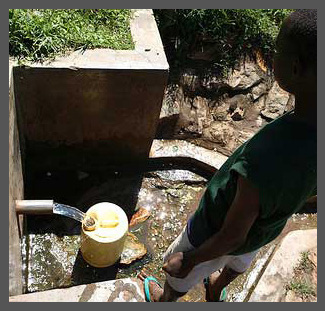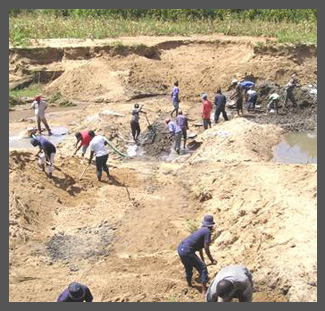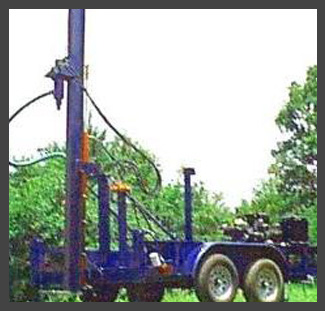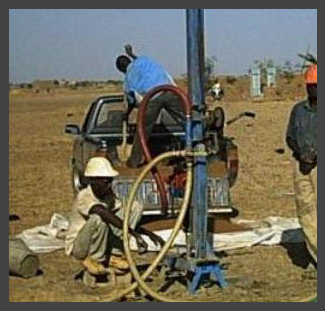Difference between revisions of "Groundwater access"
(→Groundwater links) |
(→Groundwater links) |
||
| (9 intermediate revisions by 2 users not shown) | |||
| Line 1: | Line 1: | ||
| − | {{Language-box|english_link=Groundwater access | + | {{Language-box|english_link=Groundwater access |french_link=L'accès aux eaux souterraines |spanish_link=Coming soon|hindi_link=Coming soon|malayalam_link=Coming soon|tamil_link=Coming soon | korean_link=Coming soon | chinese_link=獲取地下水 | indonesian_link=Coming soon | japanese_link= Coming soon}} |
Rainwater (if given the chance to infiltrate) eventually becomes groundwater. Groundwater is advantageous to harvest as it is always accessible (in spite of the timing of the rainy season), has a high storage capacity with good water quality (usually), is resilient to inter-annual climate variability and has a low cost relative to alternative sources. | Rainwater (if given the chance to infiltrate) eventually becomes groundwater. Groundwater is advantageous to harvest as it is always accessible (in spite of the timing of the rainy season), has a high storage capacity with good water quality (usually), is resilient to inter-annual climate variability and has a low cost relative to alternative sources. | ||
| Line 14: | Line 14: | ||
|- | |- | ||
|style="background:#efefef;"|[[Image:riverbed infiltration galleries small.jpg|center|100px|link=Riverbed infiltration galleries]] | |style="background:#efefef;"|[[Image:riverbed infiltration galleries small.jpg|center|100px|link=Riverbed infiltration galleries]] | ||
| − | |style="background:#efefef;"|[[Image:SpringwaterCollecting small.jpg|center|100px|link=Springwater collection]] | + | |style="background:#efefef;"|[[Image:SpringwaterCollecting small.jpg|center|100px|link=Water Portal / Rainwater Harvesting / Surface water / Springwater collection | Springwater collection]] |
|style="background:#efefef;"|[[Image:Subsurface harvesting systems small.jpg|center|100px|link=Subsurface harvesting systems]] | |style="background:#efefef;"|[[Image:Subsurface harvesting systems small.jpg|center|100px|link=Subsurface harvesting systems]] | ||
|style="background:#efefef;"|[[Image:Small rotary machines small.jpg|center|100px|link=Small rotary machines]] | |style="background:#efefef;"|[[Image:Small rotary machines small.jpg|center|100px|link=Small rotary machines]] | ||
| Line 20: | Line 20: | ||
|- | |- | ||
|style="background:#efefef;"|<div class="center" style="width:auto; margin-left:auto; margin-right:auto;">[[Riverbed infiltration galleries|Riverbed <br> infiltration galleries]]</div> | |style="background:#efefef;"|<div class="center" style="width:auto; margin-left:auto; margin-right:auto;">[[Riverbed infiltration galleries|Riverbed <br> infiltration galleries]]</div> | ||
| − | |style="background:#efefef;"|<div class="center" style="width:auto; margin-left:auto; margin-right:auto;">[[Springwater collection|Springwater <br>collection]]</div> | + | |style="background:#efefef;"|<div class="center" style="width:auto; margin-left:auto; margin-right:auto;">[[Water Portal / Rainwater Harvesting / Surface water / Springwater collection|Springwater <br>collection]]</div> |
|style="background:#efefef;"|<div class="center" style="width:auto; margin-left:auto; margin-right:auto;">[[Subsurface harvesting systems|Subsurface <br>harvesting systems]]</div> | |style="background:#efefef;"|<div class="center" style="width:auto; margin-left:auto; margin-right:auto;">[[Subsurface harvesting systems|Subsurface <br>harvesting systems]]</div> | ||
|style="background:#efefef;"|<div class="center" style="width:auto; margin-left:auto; margin-right:auto;">[[Small rotary machines|Small rotary<br> machines]]</div> | |style="background:#efefef;"|<div class="center" style="width:auto; margin-left:auto; margin-right:auto;">[[Small rotary machines|Small rotary<br> machines]]</div> | ||
| Line 49: | Line 49: | ||
* <font size="3">[http://www.bgs.ac.uk/africagroundwateratlas/index.cfm Africa Groundwater Literature Archive]</font>: The Archive is a searchable database of published and unpublished groundwater literature about Africa, including reports, journal articles, conference papers and maps. Many of these documents are freely available to download; for others, a link is provided to the online abstract, or a full bibliographic reference is given where the document is not known to be available online. | * <font size="3">[http://www.bgs.ac.uk/africagroundwateratlas/index.cfm Africa Groundwater Literature Archive]</font>: The Archive is a searchable database of published and unpublished groundwater literature about Africa, including reports, journal articles, conference papers and maps. Many of these documents are freely available to download; for others, a link is provided to the online abstract, or a full bibliographic reference is given where the document is not known to be available online. | ||
* VIDEO: [http://www.thewaterchannel.tv/en/videos/categories/displayresults/0?pattern=manual%20drilling&rpp=10&sort=0&ep=&ex= Lots of manual drilling videos]. Produced by UNICEF. | * VIDEO: [http://www.thewaterchannel.tv/en/videos/categories/displayresults/0?pattern=manual%20drilling&rpp=10&sort=0&ep=&ex= Lots of manual drilling videos]. Produced by UNICEF. | ||
| − | * Arjen van der Wal, [http://www. | + | * Arjen van der Wal, [http://www.unicef.org/wash/files/04.pdf UNDERSTANDING GROUNDWATER & WELLS In Manual Drilling: INSTRUCTION HANDBOOK for manual drilling teams on hydro-geology for well drilling, well installation and well development]. Practica Foundation. June 2010 (2nd Edition). French version: [http://www.practica.org/wp-content/uploads/services/publications/drilling%20manuals/FR/Understanding%20Groundwater%20%26%20Wells%20PRACTICA%20FR%20June%202010.pdf CONNAISSANCES DES METHODES DE CAPTAGE DES EAUX SOUTERRAINES: appliquées aux forages manuels]. |
* [http://www.bgs.ac.uk/research/groundwater/international/africangroundwater/home.html Groundwater resilience to climate change in Africa.] Keyworth, Nottingham. British Geological Survey 2011. | * [http://www.bgs.ac.uk/research/groundwater/international/africangroundwater/home.html Groundwater resilience to climate change in Africa.] Keyworth, Nottingham. British Geological Survey 2011. | ||
| − | * [http://www.un-igrac.org/ | + | * [http://www.un-igrac.org/resource/global-overview-saline-groundwater-occurrence-and-genesis-0 Global Overview of Saline Groundwater Occurrence and Genesis.] IGRAC, 2009. |
| − | * [http://www.iaea.org/technicalcooperation/documents/Brochures/sust-groundwater.pdf Sustainable Development of Groundwater Resources in Southern and Eastern Africa.] International Atomic Energy Agency. | + | * [http://web.archive.org/web/20151106164515/https://www.iaea.org/technicalcooperation/documents/Brochures/sust-groundwater.pdf Sustainable Development of Groundwater Resources in Southern and Eastern Africa.] International Atomic Energy Agency. |
* [http://www.rural-water-supply.net/en/resources/details/187 Siting of Drilled Water Wells - A Guide for Project Managers] RWSN Field Note 2010-5 (Cost Effective Boreholes Series). Carter, R., Chilton, J., Danert, K. et al. RWSN. St Gallen, Switzerland 2010. | * [http://www.rural-water-supply.net/en/resources/details/187 Siting of Drilled Water Wells - A Guide for Project Managers] RWSN Field Note 2010-5 (Cost Effective Boreholes Series). Carter, R., Chilton, J., Danert, K. et al. RWSN. St Gallen, Switzerland 2010. | ||
| Line 58: | Line 58: | ||
===Acknowledgements=== | ===Acknowledgements=== | ||
| − | * [ | + | * [https://ccafs.cgiar.org/publications/management-groundwater-africa-including-transboundary-aquifers-implications-food#.ViVlZxCrTyI Management of Ground Water in Africa Including Transboundary Aquifers: Implications for Food Security, Livelihood and Climate Change Adaptation.] United Nations Economic Commission for Africa, African Climate Policy Centre, 2011. |
Latest revision as of 01:09, 7 April 2016
| |
|
|
|
|
|
|
|
|
Rainwater (if given the chance to infiltrate) eventually becomes groundwater. Groundwater is advantageous to harvest as it is always accessible (in spite of the timing of the rainy season), has a high storage capacity with good water quality (usually), is resilient to inter-annual climate variability and has a low cost relative to alternative sources.
However, the height of the water table depends on a lot of factors: type of soils or rock beneath the surface, nearby reservoirs or rivers, and frequency or overall total abstraction of water from populations nearby. Also consider the quality of the groundwater. Is it too salty or near an agricultural runoff or sewage water area? Locate the infiltration or abstraction points where the water is least likely to be affected by pollutants.
Climate change considerations
Climate change affects the precipitation and temperature dynamics on a global scale, and hence will impact upon the supply and demand for water of local communities. Enhancing water storage capacity, both above and below ground, is widely accepted as a coping strategy against hydrological shocks such as floods and droughts.
Field experiences
 Project Water4Tomorrow |
Groundwater links
- Sustainable Sanitation & Groundwater Protection
- The key to successfully managing groundwater in India
- 3R Smart Solutions
- Africa Groundwater Literature Archive: The Archive is a searchable database of published and unpublished groundwater literature about Africa, including reports, journal articles, conference papers and maps. Many of these documents are freely available to download; for others, a link is provided to the online abstract, or a full bibliographic reference is given where the document is not known to be available online.
- VIDEO: Lots of manual drilling videos. Produced by UNICEF.
- Arjen van der Wal, UNDERSTANDING GROUNDWATER & WELLS In Manual Drilling: INSTRUCTION HANDBOOK for manual drilling teams on hydro-geology for well drilling, well installation and well development. Practica Foundation. June 2010 (2nd Edition). French version: CONNAISSANCES DES METHODES DE CAPTAGE DES EAUX SOUTERRAINES: appliquées aux forages manuels.
- Groundwater resilience to climate change in Africa. Keyworth, Nottingham. British Geological Survey 2011.
- Global Overview of Saline Groundwater Occurrence and Genesis. IGRAC, 2009.
- Sustainable Development of Groundwater Resources in Southern and Eastern Africa. International Atomic Energy Agency.
- Siting of Drilled Water Wells - A Guide for Project Managers RWSN Field Note 2010-5 (Cost Effective Boreholes Series). Carter, R., Chilton, J., Danert, K. et al. RWSN. St Gallen, Switzerland 2010.
Acknowledgements
- Management of Ground Water in Africa Including Transboundary Aquifers: Implications for Food Security, Livelihood and Climate Change Adaptation. United Nations Economic Commission for Africa, African Climate Policy Centre, 2011.





